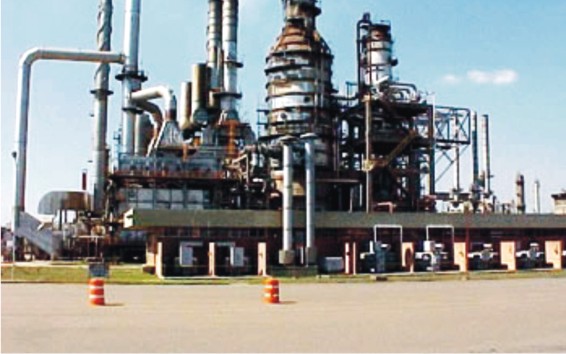 Managing Director of the Port Harcourt Refining Company (PHRC), Bafred Enjugu, says the company has returned to profit since it started receiving crude oil through marine vessels for production.
Managing Director of the Port Harcourt Refining Company (PHRC), Bafred Enjugu, says the company has returned to profit since it started receiving crude oil through marine vessels for production.
This, he said, has boosted the company’s operation, helping it meet the set target of N22 billion monthly profit.
Enjugu, in a statement by the Public Affairs Department, disclosed that the company recorded N 2.7 billion profit in May 2014, N1.7 million the following month. This, he added, has encouraged the ambitious target, especially as more of the processing plants come on stream at 60 per cent capacity.
According to him, the company is consolidating stronger, resulting in huge profits following the revival of its fluid catalytic cracking unit (FCCU) – a very critical crude oil processing plant which broke down long time ago.
The coming on stream of the FCCU, the company said, means that the key processing plants- the vacuum distillation and crude distillation units are all available, he disclosed.
Enjugu further disclosed that apart from successfully resuscitating the FCCU, several safe mechanisms put in place for optimum production has given fresh impetus in the operation of the refining company considered as one of the country’s biggest economic power house.
A source revealed that such mechanisms include the commencement of receipt of crude through marine vessels and a recent switching of power supply from the tradition boilers and turbo gas to new gas plants installed by Genesis Electric under the power purchase agreement with the Nigerian National petroleum corporation (NNPC).
Enjugu expressed optimism that the installed refining facility will ensure that the country’s largest oil refinery has the power to overcome unstable power availability and return to full capacity for refining. He pointed out that the power utility has three 25-megawatt, trail-mounted 2500+aeroderivative gas turbines to generate uninterrupted power to the company.
He recalled that before its current mission to re-strategise the refinery, power outages had drastically affected its capacity, limiting PHRC’s ability to meet the petroleum products need of Nigerians.
In his words: “The situation and other factors had forced Nigeria to import large volumes of refined petroleum products to meet its domestic needs”.
We gathered that Genesis Electric (GE), an independent power producer, signed a 20-years power purchase agreement with NNPC in November 2013 to install Tm 2500+units at the refinery for provision of both base load and back – up to support refining operations
The FCCU unit, a critical processing unit built in 1989 has an installed capacity of 40,000 barrels per stream day, but is presently operating at 60 per cent installed capacity or 24,000 barrels a day, Dr Enjugu disclosed.
He also said that the corporation’s bottom line had improved since it started receiving crude through marine vessels that attributed to its huge profit of N2.7 billion in May and N1.05 billion in June 2014.
Enjugu also observed that the reduction of operating expenses by 50 per cent impeded the operations of the PHRC. He therefore called on the NNPC management to reverse the decision since the refinery was picking up operations and undergoing Turn around Maintenance after 14 years.
